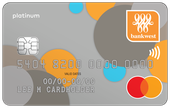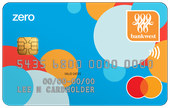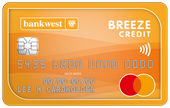You can use a credit card instalment plan to repay in fixed instalments over time, often with no interest.
Learn more about how they work, what you can use them for, and more.
What is a credit card instalment plan?
A credit card instalment plan operates like a personal loan, in that they are repaid over a fixed period of time of your choosing, e.g. 18 months. You do not have to apply for the credit card again in order to use a credit card's instalment plan, but you will have to request one to be set up for you.
When an instalment plan is in place, you'll typically make fixed repayments until repaid.
How do credit card instalment plans work?
Credit card instalment plans can be set up by contacting the bank's customer services or from within online banking. If this is the first time you have set up a plan, here's how to do it.
- Compare available plans. If you don't have a credit card yet, find one with an instalment plan that fits your needs best using the comparison table above. If you already have a card, log into its online banking and compare what options there are.
- Choose what you want. Depending on the credit card, you might be able to set up an instalment plan for part of your balance, the entire balance, or to cover the cost of a specific purchase. Choose the plan that aligns best with your needs.
- Request set up. You may need to request the bank to set up the plan if you can't do it yourself. This can be done from online banking or with customer service.
- Repayments begin. With a fixed payment plan, you will pay off a set amount each month for the duration of the plan. Some plans allow you to repay early or extend the term.
What credit card has the best instalment plan?
Since instalment plans vary widely between banks, there are a number of things to compare when deciding which is best for you.
- Amount. Check that you can use an instalment plan for the amount you want. Different plans accept different minimum and maximum amounts.
- Eligible purchases. Not all purchases are eligible to be repaid with an instalment plan. For example, it's generally not possible to move a balance transfer to an instalment plan.
- Interest rate. The interest paid on an instalment plan should be cheaper than the ongoing rate charged on purchases.
- Term. How long would you like to set up the instalment plan for? Available terms vary between banks and range from 3 months to as long as 5 years.
- Flexibility. It's almost certain that your financial situation will change given enough time, so look for the ability to change the length of the plan, to cancel, or to repay early.
- Fees. Compare what fees there are. Several plans charge an establishment fee, which can be a percentage of the amount. Some plans also charge a monthly account-keeping fee.
What can you use credit card instalment plans for?
There are several ways to use an instalment plan. These are the most common.
- Repaying debt in a set period. Unlike credit cards where you can make minimum repayments and stay in debt for a long time, instalment plans are repaid over a fixed period much like a personal loan. The fixed nature of an instalment plan means you can tackle debt and budget more easily.
- Financing a specific purchase. If you have made a large purchase — holiday, furniture, electronics, etc. — you could put it on a plan to spread the cost over time, but be assured that it will get repaid. Depending on the card, it might not be possible to convert purchases made before your most recent statement.
What banks offer credit card instalment plans?
- American Express Plan It. Pay off $150 or more of purchases from your most recent statement with interest-free instalments over 3, 6, 9, or 12 months.
- Bankwest Easy Instalment Plan. Available for eligible purchases between $100 and $10,000 from your most recent statement. Repay interest-free over four monthly instalments.
- Bank of Queensland Instalment Plan. Set up a plan for $500 or more over 1 - 5 years. Rates are personalised.
- Citi FlexiBill. Convert at least $500 of retail purchases from your latest statement.
- Citi PayLite. For $50 or more of upcoming expenses yet to appear on your credit card statement.
- Coles Instalment Plan. Convert a portion or all of your eligible purchases from you most recent statement into monthly repayments. $500 minimum.
- CommBank SurePay. Available for specific purchases ($100+), some or all of your balance ($600+), or to pay off a cash advance ($600+). Up to 10 plans with no additional credit checks.
- humm90WRAP. Available for purchases of $250 or more. Convert to an interest-free plan over 9, 12, or 15 months. An establishment fee applies.
- Latitude Financial Services. Offers plans for minimum monthly payments with the option to pay extra (6 months+), fixed repayments so you always pay the same each month, or a flexible plan with the ability to make payments at any time.
- Qantas Money Statement Instalment Plan. Convert eligible purchases from your most recent statement to an interest-free instalment plan.
- St.George Plan&Pay. Convert purchases of $200 or more from your most recent credit card statement to an interest-free plan over 3, 6, or 12 months.
- Virgin Money Instalment Plan. Convert up to 90% of your available credit into cash ($500+), purchases from your most recent statement ($500+), or purchases yet to appear on a statement ($50+).
- Westpac SmartPlan. Set up to 8 plans at any one time for specific purchases from your latest statement ($500+) or for any amount of your credit card balance ($200+).
Pros and cons
Pros
- Tackle debt. With fixed repayments, you know that your debt will be paid off when the instalment plan ends. If you have avoided dealing with your debt for too long, a repayment plan gives you a simple and structured path to being debt-free.
- Set a monthly budget. Since monthly repayments are fixed, you can plan ahead.
Cons
- There are fees. Some plans charge establishment and monthly account-keeping fees.
- You can keep spending. With your credit card still available, you could keep spending and get further into debt.








